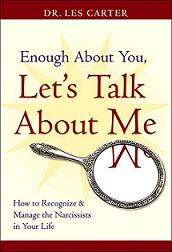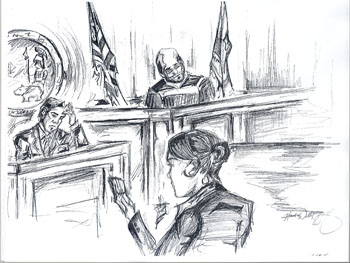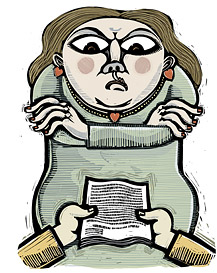
Since narcissism is univerally inherent in all of us--and we arealmost always unconscious of it--it affects nearly everything we do. This includes religion.
As I've noted in other articles, narcissism involves splitting people into "all-good" and "all-bad," projecting all evil onto the "bad," scapegoating it, and trying to destroy it, leaving only the perfect "all-good." It is, in my opinion, the basis for human sacrifice.
For a current, political/religious/economic example of this, the US has for decades considered itself "good" (indeed chosen by God), which automatically devalues the more "backward" countries, in greater or lesser degree, as "bad."
This led the US government to believe it could interfere in those countries, including, currently, the Islamic ones, essentially reducing foreign citizens to the status of "things."
In the case of the narcissist Osama bin Laden, he has a grandiose view of Islam and a devalued view of the US. He believed this gave him the right to mass-murder US citizens. In response, the US devaluved bin Laden and his cohorts as "the evil ones." It's all just a vicious circle, for millenia, everyone elevating themselves and devaluing others.
Obviously, there is such a thing as mass psychopathology. To put it as simply as possible, all narcissists--and all countries are narcissistic--are abusive. The US abuses other countries, they abuse us back, then we abuse them again. Around and around and around we go, all through the ages.
Let's apply narcissism to the idea of "perfect" religious books. All books are written by humans. People may claim it was under the direction of God, but when it comes right down to it, they're all written by people (actually these books are written by the winners, as all history is written by the winners. Then they grandiously claim they won because God was on their side).
The fact that there are so many holy books, with so many different interpretations by so many different people, shows that something has gone wrong, somewhere.
Why, then are some books, such as the Bible and the Koran, considered by some fundamentalists to be perfect and without flaw, no matter how many obvious mistakes, mistranslations and contradictions are in them? (I use the example of God walking through the Garden of Eden. God has feet?)
Because in their narcissism some people idealize--idolize-- these books (and in their narcissistic self-deception they can't admit it--they're terrified to, believing something awful will happen to them.) This means that anyone who disagrees that these books are perfect are going to be scapegoated, and the attempt will be made to destroy them (or send them to Hell.) This has been the history of the world.
Incidentally, the word "Hell" does not exist in the Bible. The word Jesus used, "Gehenna," is a proper noun referring specifically to one place, a trash dump outside the city. It was always on fire and the dead animals in it were full of maggots (translated in the Bible as "worms.") It was also the place where children had been sacrificed to Moloch.
It is interesting that Jesus used in his sayings a place of human sacrifice, just as I always found it interesting that the Gospels fail to mention that when he drove the money-changers out of the Temple, there left with them those who sold small animals, such as pigeons and doves, for sacrifice to God.
"Hel" is a Norse goddess, ruler of the underworld, who was not particularly scary except that half her face was featureless. The concept of "Hell" is an invention of dishonest, narcissistic and arrogant people who, not content with merely cursing or killing their enemies, wish to torture them for eternity.
Malignant religious narcissism is why, past and present, so many people have died in the name of religion ("Since we have God on our side, you must have the Devil on yours, so you are an unholy threat and we must kill you.")
Society sits on top of our biological, animal nature and represses it. Narcissism, since it is part of our primitive biology, is actually opposed to society. When it erupts from our animal nature into society, it damages and sometimes destroys civilization.
A definition of idolatry is to worship the Created instead of the Creator; to worship that which is false, and to worship Man and his opinions instead of the truth. To worship a book (created by man's opinions) over God (the Creator) is called "idolatry of the written word." Therefore, fundamentalists of all religions are idolators who have murdered an untold amount of people throughout history...all in the name of a "holy" book. (It's also assuming that God, having spoken once, will never speak again.)
The Third Commandment (correctly translated as "Word" or "Utterance") predicted this would happen: "You will not use God's name for vain purposes." This doesn't mean not to say "goddamn." It means not to use God's name in vain causes, like murdering people...in the name of God.
A book is not reality. It's a map, a model of reality. It can be a good map or a bad map, but it's still only a map, not reality. If it's logically coherent and corresponds to reality, it's a good map. A non-narcissistic map like that of Moses: "Don't steal, kill and envy" is a good map, one that is the basis of every successful society. A hideously narcissistic map like that of Karl Marx: "Murder, steal and envy," invariably leads to destruction and genocide.
What is truly curious about the Ten Commandments is that nearly every one of them represses our narcissistic animal nature. Murdering, stealing, and deception (lying) are what animals do it each other as their nature; envy is, as psychiatrist Richard Restak has pointed out in his book on narcissism, The Self Seekers, probably the main symptom of narcissism. Murdering, stealing, lying, envy, and splitting things into either "all-good" or "all-bad" (scapegoating) are a sure bet, slowly but surely, to bring a society to ruin.
All books are fiction. Even "non-fiction" books are fiction. They are not reality. They may be convenient, useful fictions, but they are still--all of them--fiction. They are supposed to point to reality, not replace it. If you read a non-fiction book about war, you're not actually in a war.
Many books are propaganda. They are attempts to convert people to the view of the book. If the targets are children, this can be particularly insidious, because it's an attempt by adults to essentially hypnotise them for life.
Such attempts at hypnosis are not the exclusive province of religion. Science, for all its claim of an open-minded search for the truth, is also guilty. Maybe not as guilty, but certainly not as pure and disinterested as it is portrayed.
One needs only to look at the writings of Richard Dawkins, an atheistic nihilist who attempts, quite wittily, to propagandize that his peculiar and extraodinarily narrow view of Darwinian evolution applies, without evidence, to everything in the universe. His is not a search for the truth; his is an attempt to ensorcel people as he has been ensorceled (since he idolizes evolution as God, he not surprisingly devalues and scapegoats its opponents as "possibly evil.")
Such people are self-appointed priest-kings, and self-appointed Messiahs; they attempt to set up closed systems, supposedly the absolute truth, with no dissent tolerated in doctrine or by followers. Freud did it, and so did Ayn Rand. This is not education but an attempt to blind people. They are idolaters who idealize themselves and their systems (Freud once said he thought "most men were trash.")
Pete Singer, author of Animal Liberation, is another example of an idolator. To him Nature is an idol; human beings are evil because they "damage" nature, so he unconsciously scapegoats them and calls for human sacrifice--he has suggested that infants and the elderly be euthanized.
As idolators, such people are scapegoaters. All idolators are scapegoaters.
When one reads fiction, and becomes engrossed in it to the exclusion of the outside world, one is actually hypnotised. But when one reads a "non-fiction" book, doesn't realise it is fiction, then the hypnosis can last for years. This is one of the reasons why people have such a hard time breaking free of religious cults; they think fiction is reality, and are terrified to leave...thinking something awful will happen to them.
When one person or group narcissistically claims their book is perfect, and therefore logically outcasts and scapegoats another group, the latter group, being deemed evil, will be cursed.
We may smile at primitive tribes whose shamans and witch-doctors try to cast spells on people, but what is the difference between them and more "modern" people who curse other people because they don't believe as the cursers do? Is this not a modern-day spell? Is it not literally an attempt at sorcery?
There is an amusing scene in the late '70's movie, Love at First Bite, (which is a comedy about, of all things, a disco-era vampire) when the vampire (George Hamilton) is sitting across a table from a descendant of van Helsing (Richard Benjamin.) Each is trying to hynotise the other: "You're getting sleeepy..." "No, you're getting sleepy!" "No, I'm not sleepy, you are!" And on and on, back and forth. Finally, the love interest of both of them (Susan St. James), rolls her eyes up, gets up and leaves.
This is comedy in fiction (made funnier by the fact there is a religious tone to the movie, "good" against "evil"), but in real life the effects are not amusing.
When people speak of an angry, hateful God, they're projecting their own worst, grandiose, immature, hateful narcissistic characteristics. Which is why Jesus spoke of God as "Abba," ("Daddy") an attempt to overthrow this narcissistic projection onto God. He did this in a more subtle way with John the Baptist, who comes across as a cranky fundamentalist when he refers to people as a "brood of vipers." Jesus counters this by referring to them as "children who wouldn't pipe" and then demotes John by referring to the least in the Kingdom of Heaven as greater than him.
Satan, (which means "adversary" or "accuser," then, would be an "all-bad" narcissistic projection ("the evil is not in me; it's out there.")
I suspect this projection of human characteristics is how human sacrifice got started. How to placate these awful gods? We must project our evil onto a scapegoat and then destroy it. With the evil gone, the gods will be sated and not destroy us. But why not sacrifice, say, a mouse? Not important enough. So what's important, in fact the most important of all? Human life. This is why in the Bible children were sacrificed to Moloch.
I doubt the sacrificers really wanted to sacrifice. They were terrified not to.
There are quite a few subtle references to the evil of sacrifice in the Bible. The myth of Satan is the story of a psychopath who wishes to sacrifice everyone; Adam tries to sacrifice Eve and Eve tries to sacrifice the serpent: Gehenna was a place of human sacrifice: Jesus drove out of the Temple those who sold pigeons and doves for sacrifice.
The Nazis and Marxists engaged in human sacrifice, as do fundamentalists. We have to get rid of these evil people or we will be destroyed! When Muslims blow planes out of the sky in the name of jihad ("holy war") it's still human sacrifice. For that matter, all war can be considered a form of human sacrifice.
A map of the world is not the world. A very detailed map (logically coherent and corresponding to reality) is an excellent map. A bad map, on the other hand, will only get you disoriented, lost, or killed.
In the long-run what the map produces is what counts. Jesus' comments about "bad trees producing bad fruit" and "good trees producing good fruit" are relevent. Unfortunately, a tree can be both good and bad at the same time, and produce both good and bad fruit. This is why religion has created such good and evil. (The anti-narcissism in religion, exemplified by the Golden Rule, is one of the things that has advanced society. The narcissism in religion-- "I'm right and I'm going to kill you and send you to Hell"--is what has sent society and religion backward.)
There is, unfortunately, a lot of narcissism in the Bible. In the Gospels some Pharisees scapegoated the outcasts, such as the diseased, prostitutes, the poor, women, and gentiles. They were considered impure and unclean. This is an excellent example of "We are good because we are God's chosen--we are wealthy, healthy, male, and of the right religion. You, because you fit none of those categories, are bad." Pure narcissism.
It is these hypocrites that Jesus spoke against when he attempted to include outcasts in society. He was trying to overcome his opponents' narcissism.
However, not all Pharisees are as the Gospels portrayed them. Jesus himself was apparently a Pharisee speaking against the close-minded fundamentalists of his age. Unfortunately, the writers of the Gospels turned around and scapegoated the Pharisees--and especially the Jews, even though Jesus was a Jew. These scapegoating of Jews in the Gospels is what has led to nearly 2,000 years of anti-Semitic genocide. This is why, as M. Scott Peck has so clearly pointed out, that scapegoating is the genesis of human evil.
If the Jews have been historically devalued and scapegoated, then who has been idealized? Jesus has--he has been idolized as God.
However, he never claimed he was God (the closest was when he said, "I and the Father are one.") When he was addressed as "good rabbi," he claimed, "Why do you call me good? No one is good but God." His healing power was stolen from him, and he did not know who did it; he was helpless to heal unless people had faith that he could; he said people would know "the Father" and be told all they needed to know; he said people could be his equal when trained, and could do all that he did, and more. He said there were things he did not know, but only God did.
Jesus, then, has been turned into an idol. Hence all the killing done in his name. All idolators are scapegoaters, and all scapegoaters are idolators. Seeing something as "perfect" always involves something else being scapegoated to order to maintain the "perfection."
One of the ways he was narcissistically idolized is through the Virgin Birth. The word "virgin" is actually translated "young woman." The two Jewish writers of the Gospels, being able to read the original writings, never mentioned the Virgin Birth. The two non-Jewish writers, only having access to the mistranslations, created it (and stories of virgin births exist in other mythologies, so, like "Hell," this is more pagan influence in the Bible).
The power of Christianity comes from believing we are forgiven. Nietzsche made some interesting comments about forgiveness. When he wrote that "God is dead" he didn't mean that God had actually died. He meant that the educated people of his time had ceased to believe. And with no one to forgive them, they would begin to hate themselves or hate others. He predicted the horrors of the 20th Century.
When people can't forgive, they scapegoat. If they can't forgive themselves, they cast their evil onto others and scapegoat them.
Bob Wallace
 Narcissism and Intimacy: Love and Marriage in an Age of Confusion
Narcissism and Intimacy: Love and Marriage in an Age of Confusion















